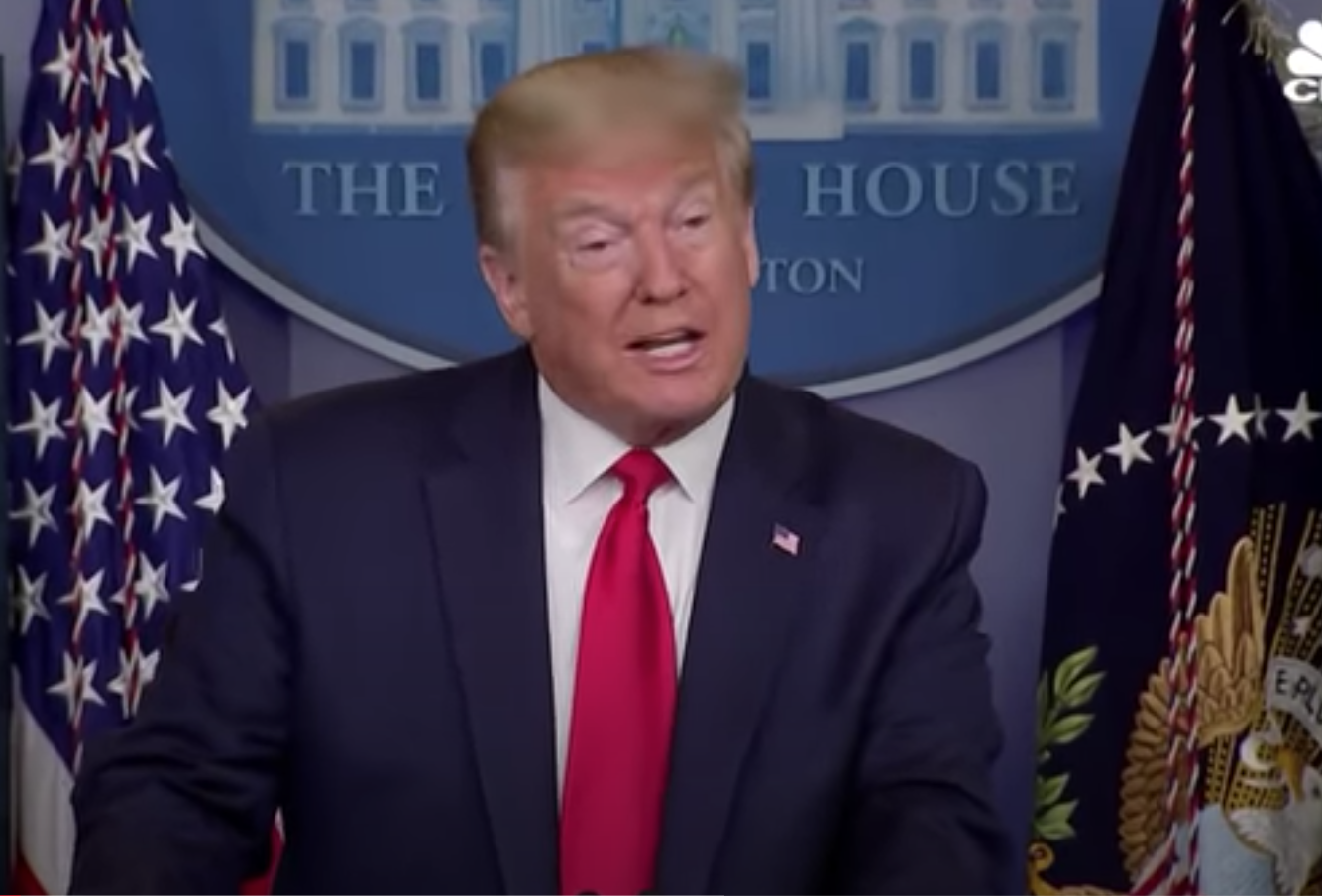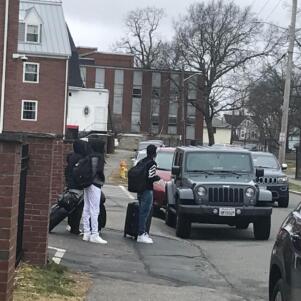VIRTUE SIGNALING ALERT: Liberal Media Smears Gen. Kelly’s Criticisms of Congresswoman Who Listened in on Grieving Widow’s Call as Boston-Style Racism, Sexism
By Evan Lips | October 20, 2017, 17:48 EDT

Hours after White House Chief of Staff John Kelly finished holding a press conference in which he expressed his shock that a Florida congresswoman listened in on a condolences call President Donald Trump made to the widow of a fallen soldier, a narrative labeling General Kelly as racist and sexist over his Boston Irish upbringing quickly formed in liberal media corners.
MSNBC political correspondent Joy Reid apparently took her cue from network colleague Lawrence O’Donnell, who used his pulpit as host of MSNBC’s The Last Word to try to tie Kelly’s criticisms of a black female lawmaker with the decorated general’s Oak Square background:
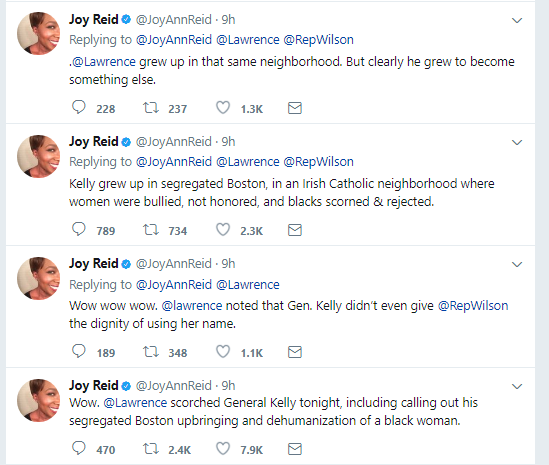
During his remarks Thursday, Kelly carefully walked reporters through the steps taken whenever a family needs to be notified of the service-related death of a loved one, including how the deceased’s body is preserved en-route from overseas.
Kelly said he initially advised Trump to hold-off on calling Sergeant La David T. Johnson’s widow, Myeshia Johnson.
Trump, Kelly said, persisted.
According to various reports, U.S. Representative Frederica S. Wilson (D-Florida) was inside a limousine with Johnson when she took the call. Trump reportedly told Johnson, in his condolences, that her husband “knew what he signed up for” — which Wilson subsequently relayed to the media, along with the claim that Trump’s choice of words were “insensitive” and upset Johnson’s widow.
Wilson later joked that the attention she’s subsequently received has transformed her into a “rockstar.” (See video at bottom of story.)
Democrat Congresswoman totally fabricated what I said to the wife of a soldier who died in action (and I have proof). Sad!
— Donald J. Trump (@realDonaldTrump) October 18, 2017
Kelly said he was “absolutely stunned” to learn that “a member of Congress would have listened in on that conversation.”
“When I listened to this woman, what she was saying, and what she was doing on TV, the only thing I could do was to collect my thoughts and walk among the finest men and women on this earth,” Kelly said, referring to a walk he took through Arlington National Cemetery after hearing Wilson’s comments, apparently to ease his mind.
Kelly lost his own son, 1st Lieutenant Robert M. Kelly, killed while serving in Afghanistan in November 2010.
Meanwhile, more than 48 hours later, Trump has yet to provide the public with proof that Wilson’s report of his call to Johnson’s widow was fabricated. It is still unclear whether Trump is alleging that he never said those words, or whether he claims that the explosive ordeal was spun by Wilson to take advantage of a grieving constituent in order to purposely embarrass the commander-in-chief.
As for Kelly’s comments Thursday, he also told reporters about his memories attending a 2015 dedication in Miami, Wilson’s home district, of a new FBI field office, named after two agents killed in 1986 during a shootout with drug traffickers. Without mentioning Wilson by name, he recalled the congresswoman’s actions that day:
“And a congresswoman stood up, and in the long tradition of empty barrels making the most noise, stood up there and all of that and talked about how she was instrumental in getting the funding for that building, and how she took care of her constituents because she got the money, and she just called up President Obama, and on that phone call he gave the money — the $20 million — to build the building. And she sat down, and we were stunned. Stunned that she had done it. Even for someone that is that empty a barrel, we were stunned.”
Kelly’s emotional appearance drove media headlines Thursday afternoon and into the evening, even overshadowing a stump speech Obama gave earlier that day in New Jersey on behalf of a Democratic candidate for Congress.
But the narrative that unfolded on O’Donnell’s MSNBC program involved accusing Kelly of blatant racism and sexism.
I am stunned by John Kelley’s lies about a black woman who he called an ’empty barrel.’ https://t.co/cqA2pQ3vWp via @msnbc
— Lawrence O’Donnell (@Lawrence) October 20, 2017
Wilson later praised O’Donnell’s efforts:

The Miami Herald caught up with Wilson. The newspaper’s report, headlined “In attack on Frederica Wilson over Trump’s call to widow, John Kelly gets facts wrong,” recounted the building dedication ceremony and quoted Wilson’s claim that Kelly lied about his recollections — but admitted at the same time that reporters were unable to dig up any video or transcripts documenting what actually transpired.

O’Donnell, however, correctly pointed out that Trump did not make the call to Johnson’s widow and others until after being questioned Monday about the October 4 deaths of four soldiers in Niger, killed during an ambush attack perpetrated by Islamic State fighters.
@CBSNews reenactment of a firefight/ambush in Niger is truly something to behold. pic.twitter.com/5EUFFLklHm
— Evan Lips (@evanmlips) October 19, 2017
As for Kelly, O’Donnell chastised the general for failing to show any empathy for Wilson.
“He talked about her a lot, he talked about her a lot more than he talked about President Trump or his sons, and he never mentioned her name,” O’Donnell said. “He called her ‘an empty barrel,’ he dehumanized her, in fact, from start to finish, John Kelly’s comments in the briefing room today were essentially a lecture about his moral superiority over her.”
O’Donnell continued:
“John Kelly had absolutely no empathy for Frederica Wilson today, but they have more in common than John Kelly realizes — they were both born in segregated cities. They both went to segregated schools.
“When John Kelly was going to school in Oak Square in Brighton, in the Boston-Irish neighborhood that he grew up in, the schools were segregated by custom and practice. Boston’s segregation in the 1950s while John Kelly was in school was as flawless as the legal segregation in Florida and in the rest of the South. John Kelly never sat beside a student like Frederica Wilson in his elementary school.”
O’Donnell continued pressing the racial narrative:
“The language about black people in John Kelly’s neighborhood was exactly the same language about black people that was used at that time in white communities in the segregated South. I grew up a few years after John Kelly in an identical neighborhood on the other side of Boston and I went to high school in John Kelly’s neighborhood. I know the neighborhood John Kelly comes from, I know the culture. It was a neighborhood in which calling someone who looked like Frederica Wilson an ’empty barrel’ was the kindest thing that would have been said about her. De-segregation came very painfully to the Boston schools long after John Kelly finished high school, and the pain of de-segregating Boston schools was visited entirely upon the students who looked like Frederica Wilson, and the stones that were thrown at their buses, and the eggs that were thrown at Ted Kennedy’s car because he supported de-segregation, all came from that culture that John Kelly and I grew up in, and no one was yelling ’empty barrel’ at those buses, white elementary school students and high school students and their parents were screaming the worst possible racial epithets at those buses, filled with black children, and John Kelly knows that.”
O’Donnell later acknowledged that he “didn’t mind hearing hearing John Kelly disagree with Congresswoman Wilson” but stressed that he “was stunned, stunned, when I watched him de-humanize her in very deliberately continued to dehumanize her and refused to give her the dignity of a name and called her an empty barrel.
“He went out of his way to do it. It came after everything he had to say about the phone call controversy, he was finished with that, and then he reached back to tell a long story from 2015 during the dedication of a new FBI field office in Miami, a field office that Congresswoman Wilson had helped get the money for.”
O’Donnell played the clip of Kelly recalling his experience attending the building dedication. He noted Kelly’s references to “what was sacred” when the general was a child growing up in Boston.
“You know, when I was a kid growing up, a lot of things were sacred in our country,” Kelly said. “Women were sacred, looked upon with great honor. That’s obviously not the case anymore as we see from recent cases. Life — the dignity of life — is sacred. That’s gone. Religion, that seems to be gone as well.”
O’Donnell slammed Kelly, recalling that what wasn’t sacred when he was growing up “were black women or black people.”
“And oh, by the way, women were not sacred either, they were not honored,” O’Donnell quipped. “In John Kelly’s neighborhood, in the Catholic parish where he grew up, in the Catholic parish where I grew up, women were getting beaten by their husbands, their drunken husbands as a normal weekly occurrence.”
O’Donnell pointed out that Wilson got her start professionally as a teacher and later became a principal and got involved as a member of her local school board, where she created a mentoring program that Johnson participated in as a school boy.
“When Frederica Wilson was a little girl there were no black women members of Congress to look up to,” O’Donnell said. “When John Kelly was a little boy everywhere he looked in America there was someone who looked like him at the top.
“And so today, when John Kelly nostalgically looked back on a world that never was, where women were ‘sacred,’ he was standing in the White House occupied by the president who has not only dishonored women, he is the only president in history who has confessed to sexual assault.”
O’Donnell closed his monologue by labeling everything Kelly said about Trump as “barely coherent.”
“When he attacked a Democratic congresswoman and defended a Republican president he was purely partisan, and he was not telling the truth. He [Kelly] took time, a lot of extra time, to call a black woman that he doesn’t know and he doesn’t like an ’empty barrel.'”
O’Donnell’s remarks were praised by other politically-connected network personalities, like CNN’s Donna Brazile:
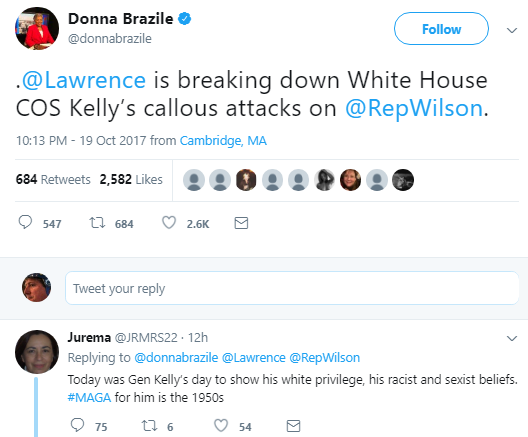
Former Daily Show personality John Hodgman, who grew up in Brookline, also chimed in:
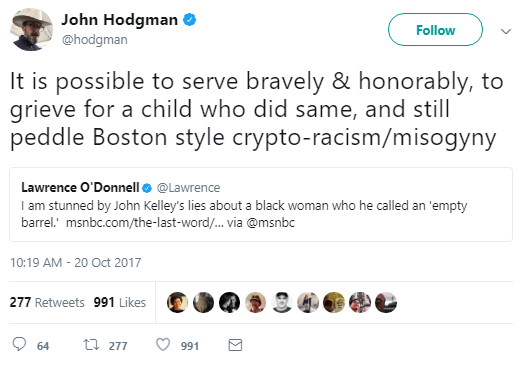
The Washington Examiner‘s T. Becket Adams had a different take on the verbal skirmish:
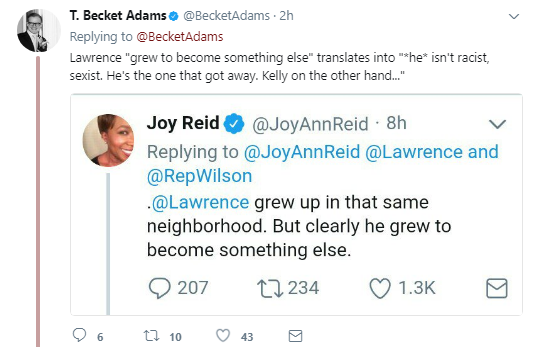
Wilson’s “rockstar” comment:
Rockstar. pic.twitter.com/6hf8ncDQUd
— Evan Lips (@evanmlips) October 20, 2017

